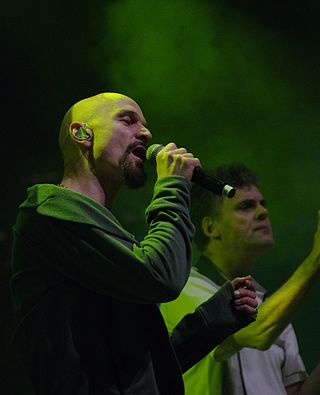
James are an English rock band from Manchester, who were formed in 1982. They had popularity throughout the 1990s, with four top 10s on the UK Singles Chart and nine top 10s on the UK Albums Chart. The band's best-known singles include "Come Home", "Sit Down", "She's a Star" and "Laid", which also became a hit on American college radio.

The Remote Part is the third studio album by Scottish rock band Idlewild, released on 15 July 2002 by Parlophone. As they were becoming increasingly aware of their label's interest in them and their demos, the band's musical direction was being steered by guitarist Rod Jones. For the first half of 2001, the band recorded songs with producers Stephen Street and Lenny Kaye. Due to the uneven nature of the songs done between tours, they spent some time reworking 20 tracks in the Scottish Highlands. They recorded at Rockfield Studios in Wales, RAK Studios in London, and Sawmills Studios in Cornwall with producer Dave Eringa. Described as an alternative rock and indie rock record, it lacked the punk rock elements of their previous work.

Up at the Lake is the eighth album by the British alternative rock band The Charlatans, released on 17 May 2004 through Universal and Island Records Group. As promotion wrapped up for their seventh album Wonderland (2001), Universal wanted them to follow it up with another one quickly. However, frontman Tim Burgess began working on his debut solo album in late 2002. At the end of the year, the band reconvened to write songs; by March 2003, they relocated to their own studio, Big Mushroom in Cheshire, Greater Manchester with them and James Spencer serving as producers. Recording halted in May 2003 to allow for Burgess to finish on his album, I Believe (2003); sessions would resume by the end of the year, and finish in February 2004. Up at the Lake is a pop rock album that pursues the country rock direction that they had first explored on their sixth album Tellin' Stories (1997).

Laid is the fifth studio album by British rock band James. It was released on 27 September 1993 through Fontana Records. The album's sound, which is "stripped-down" as compared to their prior releases, was inspired by their recent experience touring as supporting act to Neil Young. Enlisting Brian Eno as producer, James recorded for six weeks at The Windings in Wrexham, Wales, and Real World Studios in Box, Wiltshire. The sessions also resulted in the experimental sixth studio album Wah Wah (1994). Laid is a folk and pop rock album that was reminiscent of their earlier releases with its atmosphere and minimal arrangements.
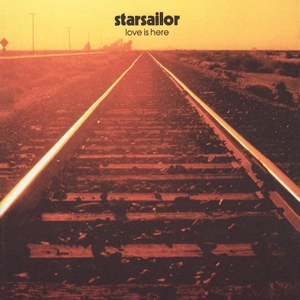
Love Is Here is the debut studio album by rock band Starsailor, released on 8 October 2001 by Chrysalis Records. After finalising their line-up, a positive review from NME started a bidding war between record labels that eventually saw the band sign to EMI. Following the making of some demos, "Fever" and "Good Souls" were released as singles on 4 February 2001 and 23 April 2001, respectively. The band recorded their debut album at Rockfield Studios with producer Steve Osborne over the course of six weeks. Love Is Here features acoustic guitars accompanied by gentle piano chords, earning it comparisons to the albums Parachutes (2000) by Coldplay, and The Invisible Band (2001) by Travis.

The Good Will Out is the debut studio album by British rock band Embrace, released on 8 June 1998, by Hut, Mobetta and Virgin Records. The band formed in 1993; by 1996, they consisted of vocalist Danny McNamara, his brother, guitarist Richard McNamara, drummer Mike Heaton and bassist Steve Firth, and Tony Perrin had become their manager. A single, "All You Good Good People", was released through Fierce Panda in February 1997, attracting music media and record label interest, resulting in the band signing to Hut. Produced by the band, Dave Creffield and Youth, sessions for their debut were held at the Hook End, Whitfield Street and Metropolis studios. Other production staff included Jonny Dollar, who almost produced the album, Steve Osborne, who did additional production on one song, and Hugo Nicolson, who handled recording on another.

Drawn from Memory is the second album by English rock band Embrace, released on 27 March 2000 by Mobetta, Hut, and Virgin Records. Following the release of their debut studio album The Good Will Out (1998), touring keyboardist Mickey Dale became an official member. Frontman Danny McNamara began suffering from writer's block, leaving guitarist Richard McNamara to handle the writing. Sessions were done at Batsford Park Manor in Gloucestershire, Olympic Studios in London, and Soundworks Studios in Leeds. Tristin Norwell and the band producer the entire album, bar "You're Not Alone", which was produced by Hugo Nicolson. Songs on the album centred around the arrangements and the interplay between instruments, instead of being melody-driven.
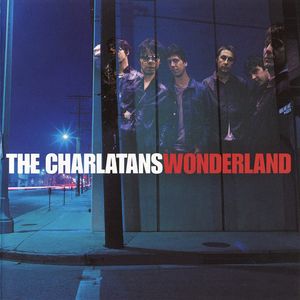
Wonderland is the seventh album by British rock band the Charlatans, released on 10 September 2001 through Universal. Following promotional efforts for their sixth studio album Us and Us Only, vocalist Tim Burgess and guitarist Mark Collins wrote new material at the former's house in Los Angeles, California. Cocaine would be an impact on the writing, and later on recording; sessions were held at producer Danny Saber's house studio, Krevorkian's Lab, also in Los Angeles. The band worked with him for seven weeks from October 2000, only completing five tracks, and later went to their own studio, Big Mushroom in Cheshire, Greater Manchester, in early 2001. Wonderland is a funk-soul and electronica record, evoking the work John Mellencamp, Oasis and Primal Scream. Burgess remarked that Los Angeles itself became a member of the band; critics referred to it as a drug-enhanced party album. He employed a falsetto in the vein of Curtis Mayfield and Kurt Wagner.
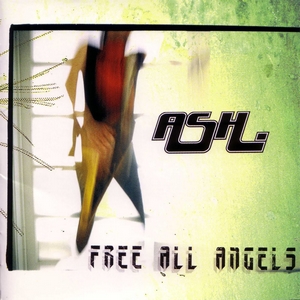
Free All Angels is the third studio album to be recorded by Northern Irish rock band Ash. It was released on 23 April 2001 through Infectious Records and Home Grown. Due to the mixed reaction to the band's second studio album Nu-Clear Sounds (1998), frontman Tim Wheeler suffered from depression. He went to his parents' house in Northern Ireland to write material for the band's next album. Free All Angels was co-produced by the band and Owen Morris, and recording sessions were held at El Cortijo in Puerto Banús, Spain, then moved to The Wool Hall in Beckington and RAK Studios in London. The album was described as pop punk, power pop and punk rock, and drew comparisons to the works of China Drum, Compulsion, Hüsker Dü, and the Replacements.

Stutter is the debut studio album by English rock band James. Blanco y Negro and Sire Records released it on 28 July 1986. After going through multiple vocalists and guitarists, the band caught the attention of Factory Records. James released two EPs with the label; between them Larry Gott replaced guitarist Paul Gilbertson. The band supported the Smiths twice, before eventually signing with Sire. Between January and March 1986, the band recorded Stutter with Patti Smith live guitarist Lenny Kaye and engineer Gil Norton. Described as a folk rock album, the songs on Stutter tackle the topics of insects, reincarnation and being a tortured artist.

Strip-mine is the second studio album by English rock band James. It was released on 26 September 1988, through Sire and Blanco y Negro Records. After minimal touring and lack of success for their debut studio album Stutter (1986), the label was apprehensive about letting them record another album. Sessions for it were held in early 1987 at Rockfield Studios with Hugh Jones producing the majority of the album, except for "Are You Ready", which produced by Steve Power and Steve Lovell. After the recording, the release was delayed a number of times, until it was eventually remixed early the following year at London's Battery Studios. Described as a folk-pop album, the songs on Strip-mine tackled the topics of misinformation, addiction, and human mortality.

Gold Mother is the third studio album by English rock band James. It was released on 4 June 1990 on Fontana Records. With the addition of drummer David Baynton-Power, violinist/guitarist Saul Davies, and keyboardist Mark Hunter, James released the single "Sit Down" in June 1989, before going to record their next album. Sessions were held at Out of the Blue in Manchester, The Windings in Wrexham, Wales, with three band members and Nick Garside producing. Described as an arena rock and indie rock album, Gold Mother was compared to the likes of U2 and the Waterboys.

Seven is the fourth studio album by English rock band James. It was released on 17 February 1992, through Fontana Records. After writing new material in their practice space, the band began recording at The Manor Studios. The sessions lasted for several months, with the band producing the proceedings themselves. After a lack of progress, Fontana halted the sessions, and sent them to work at Olympic Studios with Martin "Youth" Glover. Half of the songs were produced by Youth, while the remainder was produced between James and Steve Chase. Described as a stadium rock album, Seven drew comparison to the likes of Simple Minds and U2.

Wah Wah is the sixth studio album by the Manchester-based English indie rock band James. After the success of their fourth album, Seven (1992), the band entered Real World Studios, Box, Wiltshire, to record their fifth album Laid in early 1993 with producer Brian Eno, with whom the group had longed to work. Prior to recording Laid, Eno observed the band's jam sessions at their Manchester rehearsal room, and considered these improvised pieces to be as important to the band's music as their eventually crafted songs. He requested to the group that whilst they were recording Laid, they would also concurrently record an album of their improvisations which Eno and, by Eno's request, second producer Markus Dravs would produce in a secondary studio in the Real World complex. Each composition started off with the band's improvisation being recorded, which Dravs would then edit, generally alone whilst James and Eno were recording Laid. Eno and Dravs would take a "promising" part of a recording and then mixed them only once. Tim Booth's desire to re-record some of his vocals caused friction in the studio.

Whiplash is the seventh studio album by English rock band James. It was released on 24 February 1997, through Fontana Records. Following the release of the band's experimental sixth studio album Wah Wah (1994), they began working on a follow-up in 1995 at drummer David Baynton-Power's home studio. Over the course of 1995 and 1996, James recorded at several studios – Westside, The Windings, Cafe Mullet, Real World, RAK, and Foel – with producers Stephen Hague, Brian Eno, and Baynton-Power. Described as electronic and folk rock release, the album mixed in elements of the band's previous two studio albums.

Millionaires is the eighth studio album by British alternative rock band James. During the Whiplash release cycle, guitarist Adrian Oxaal replaced founding member Larry Gott, and guitarist Michael Kulas joined the band. Touring to promote the release was cut-short when Booth injured his neck. With the release of The Best Of in early 1998, the band began recording their next album in May 1998. The sessions continued into February 1999 at a variety of studios: Ridge Farm, Hook End, Townhouse and Metropolis. While Brian Eno produced most of the record, the producer credit was also given to guitarist/violinist Saul Davies, keyboardist Mark Hunter, Steve Osborne, drummer David Baynton-Power and Faithless. Millionaires is an indie rock and pop release that drew comparison to Lou Reed and New Radicals.
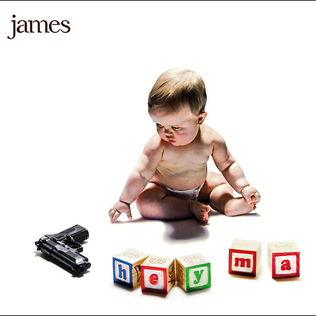
Hey Ma is the tenth studio album by British rock band James. After reuniting in 2007, James went on tour until September that year, when they began recording their next recording. Taking up residence in Château de Warsy in France, the band worked on 120 pieces of music. While extra recording was done in England, sessions concluded by December. Hey Ma was a return-to-form for the band as they continued their signature sound of loud guitars and big choruses, with occasional trumpet appearances. Before the album was released, the cover was banned due to its depiction of a baby with a gun close by.

The Night Before is the 11th studio album by British rock band James, serving as the first of two mini-albums. Following the release of their 10th studio album Hey Ma (2008), the band sought to experiment and take risks for their next record. They worked on material and uploaded it to a FTP server, for download by others. After three months, Lee Muddy Baker pieced the tracks together. The Night Before is a power pop and space rock release, with individual track comparisons to U2, Joy Division and Cocteau Twins. Preceded by a UK tour, The Night Before was released on 19 April 2010. The album reached number 20 in the UK, and received a mainly favourable response from music critics, with a few of them finding it an enjoyable record.

Girl at the End of the World is the 14th studio album by British rock band James. It was released on 11 March 2016, through BMG. The band spent three weeks in the Scottish Highlands working on new material for their album. Re-enlisting producer Max Dingel, who produced their previous studio album, La Petite Mort (2014), James spent five months between May and September 2015 recording in separate blocks. Long-time collaborator Brian Eno, and former member Adrian Oxaal, contributed instrumentation to the sessions. The album reprised its predecessor's electronic-centred songs and dance rhythm sections.

Living in Extraordinary Times is the 15th studio album by British rock band James. It was released on 3 August 2018, through Infectious Music. A few months after the release of the band's 14th studio album, Girl at the End of the World in 2016, work began on a new album. Writing and three weeks of jam sessions followed, with engineer Beni Giles appearing partway through the sessions. Recording took place at Livingston and Iguana studios, both of which are in London, and lasted for four weeks, with Giles and Charlie Andrew handling co-production. Described as an indie rock record with elements of electronica, the album drew comparisons with the music of U2, the Killers, and the Courteeners. The music incorporates grooves, which were aided by bassist Jim Glennie, drummer David Baynton-Power, Andrew, and Giles.




















